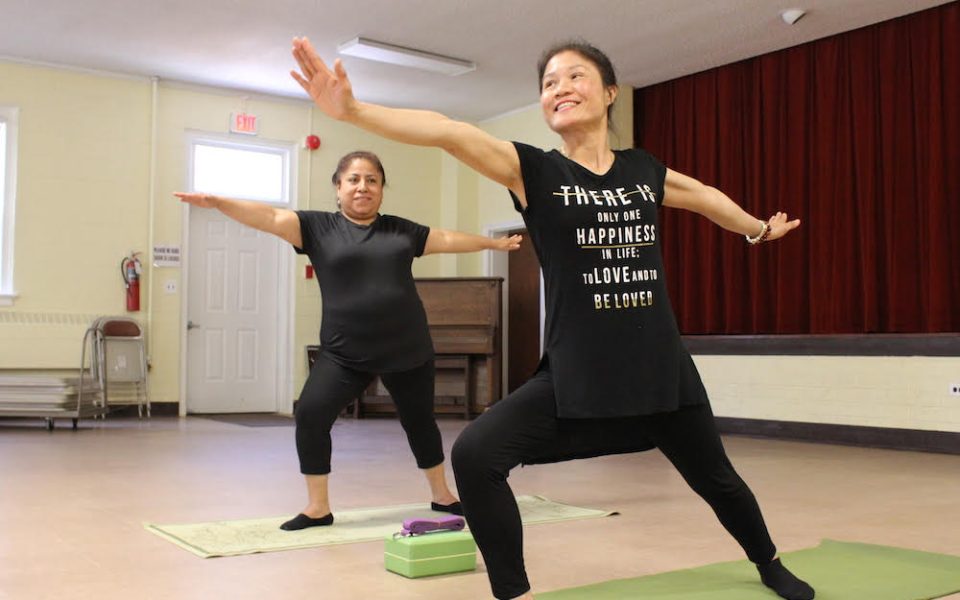The plastic beach ball floats in the air, stripes of red, white, yellow and blue twirling as it makes its descent. A woman wearing a grayish hijab catches it, carefully reading one of the handwritten words scrawled across the plastic in black ink.
“Mountain!” she exclaims.
Suddenly, a half-dozen women shamble from seated positions and head to the edges of their yoga mats. They stand tall and proud, feet planted firmly, gazes forward.
“Do you like our mountains?” asks Patty Balboni, the yoga instructor.
The rest of the women, who remain seated on their mats, clap their hands as those standing beam down at them.
Balboni is the fourth teacher to volunteer to lead the weekly, free yoga class for refugee and immigrant women held at a local Greensboro church. The class began after Mona Flynn, the main yoga teacher and organizer, partnered with the New Arrivals Institute, an organization that offers ESL classes as well as employment readiness and cultural orientation programs to immigrants.
Because of the recent terrorist attacks against places of worship, particularly mosques, and at the request of the New Arrivals Institute, TCB has chosen not to disclose the specific location or day of the week of the classes.
The scene takes place in a cinderblocked room, where a circle of chairs carves out a makeshift yoga studio. More than a dozen women have gathered to practice within the lemon-painted walls, where slivers of light peek through the window blinds, illuminating the yogis as they contort their limbs to match Balboni’s instructions, pose after pose.
“When we build core strength, our inner strength,” Flynn says, “we are more ready to face our daily challenges, what calls on us. But it also helps with our spiritual well-being.”
Flynn has been teaching yoga for 30 years and came up with the idea of providing a class for refugee and immigrant women after years of working with organizations that advocate for immigrants in the community. Her family is originally from Syria, and she says that some of her relatives still live in the war-torn country.
“I thought, What if we provided a class that is more therapeutic, and at the same time, involves community?” Flynn says.
That’s when she reached out to Thompson.
“We love our clients and we care about them…our clients are virtually all undiagnosed PTSD,” Thompson says. “That’s the way it is for refugees…. It’s very likely that they saw, that they were part of violence and persecution…. Their trauma could have been very intense.”
This week’s class marks the halfway point for the series. The first class took place on April 9 and about 20 women came to participate. Many of the women are Muslim and wear headscarves while they practice. Others are from Spanish-speaking countries or from Asia. Flynn, who speaks Arabic, translates the cues during the classes.

“People have so taken to it and it has really been wonderful,” she says.
In addition to a teacher who volunteers to lead the class, Flynn also organizes volunteers to provide childcare for the mothers during the class and asks some of her students to come practice alongside the women to make them feel comfortable and to get to know them.
Many of the participants are still learning English and are silent and reserved at the beginning of the class. However, as their bodies become more flexible, so to do their demeanors and they begin to make jokes and giggle as the hour goes by.
Towards the end of class, Balboni instructs the women to stand in a circle and brace their hands against their neighbors’, as they balance on one leg in eagle pose; they grin as they struggle to stay upright.
“I like yoga,” says Gam Nguyen, an immigrant from Vietnam and one of the participants in the class. She says she’s been coming to the yoga sessions since the beginning.
“It’s relaxing and healthy,” she says.
Her friend, Luz Sosa, a woman who immigrated from Mexico two decades ago, nods next to her in agreement.
Flynn says she hopes to do another session in the fall after applying for grants to help pay the teachers and buy more supplies.
“What I hope evolved from this is a recognition that we are all integral to the world community,” Flynn says. “We need to [show] these women that they are accepted… and not reject them.”
As the women roll up their mats and head to the parking lot — already thinking about picking up their kids from school or what they learned in their English classes that day — a few of them say goodbye, promising each other that they’ll be back the same time next week.
“I’ll keep coming,” Nguyen confirms as she helps carry blocks and straps back upstairs. “It’s good for friendship.”
Join the First Amendment Society, a membership that goes directly to funding TCB‘s newsroom.
We believe that reporting can save the world.
The TCB First Amendment Society recognizes the vital role of a free, unfettered press with a bundling of local experiences designed to build community, and unique engagements with our newsroom that will help you understand, and shape, local journalism’s critical role in uplifting the people in our cities.
All revenue goes directly into the newsroom as reporters’ salaries and freelance commissions.


[…] an ongoing community-service project that uses yoga to strengthen the body, mind, and spirit, for immigrant and refugee women. “We can do our work better and really hear what we need to provide [to this […]
[…] together to demand justice for their kids. Women cleaning each other’s homes for free. People volunteering to teach yoga to refugees. Artists creating for the greater good. Workers advocating for better treatment for […]